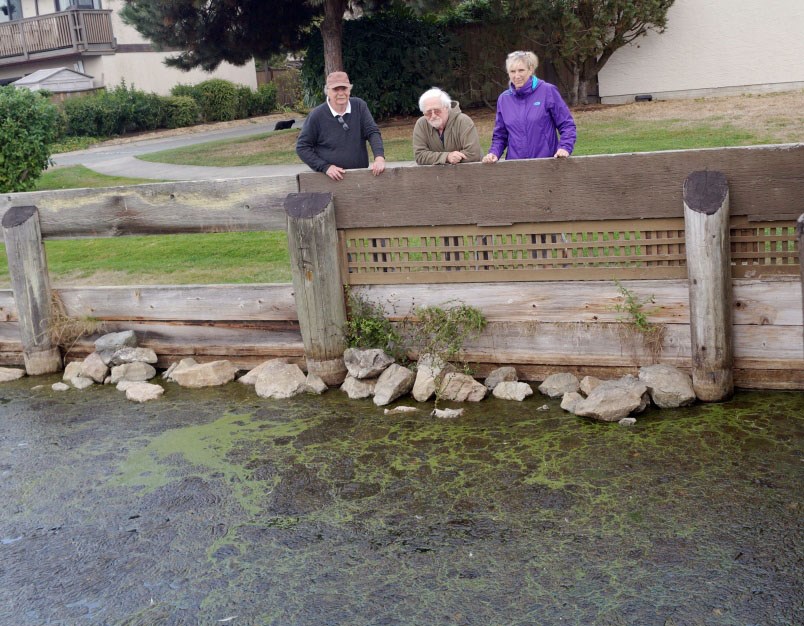A rare outbreak of a tropical, invasive plant in drainage canals and ponds, managed by a residential strata in Steveston, is threatening Richmond’s environmentally sensitive Sturgeon Bank.
Michael Krygier, strata council president at Mariner’s Village, says Brazilian elodea has overtaken the strata’s landscaped waterway between the townhouses and West Dyke.
And it has officials and concerned residents scrambling to find a solution, which could prove costly.
“It’s become stagnant and, as a result, we’ve had mosquitos, more than we’ve ever had before, and we’ve lost some wildlife (geese, ducks and beavers) that used to exist here. And the odour has been aggravating some owners,” said Krygier, adding the waterway serves as an aesthetic feature for residents and dyke patrons alike.
“It is a beautiful place to look at,” he said.
Because the canal and ponds drain into the Bank, via a City of Richmond pumping station, the Ministry of Forests, Lands, Natural Resource Operations and Rural Development is assessing the outbreak, which arose in the summer of 2015.
The Bank is home to baby salmon and numerous other species that depend on native plants.
Krygier believes the problem began when someone emptied an aquarium in the pond. Then, during the 2015 drought, city officials investigated the outbreak, as the waterway is largely city property, and realized the strata was pumping fresh water into the pond to maintain its level. The city then installed a water meter and the strata realized it would cost about $110,000 to supply the waterway annually, so Krygier shut off the taps. Over time, the elodea, a stringy, perennial spread.
According to the Ministry, elodea prefers slow-moving freshwater bodies, with low light, however a spokesperson said officials haven’t determined an exact fix for this specific waterway.
Because the strata turned off the taps, the water levels have dropped about six inches, and there’s been no apparent pumping into the Bank, nor reports of elodea on the other side of the dyke. But heavy winter rains could cause an overflow.
The strata had pumped more water into the pond than what may actually be needed, explained resident Cindy Roberts, chair of the strata’s landscape committee.
Roberts thinks the strata could pump less water into the waterway, to maintain a certain level, and then add circulating fountains.
“Once we hit the level, we can stop the water,” said Roberts.
Krygier said the strata would consider purchasing the fountains for up to $30,000.
“We’re willing to work with the city. It’s a matter of removing (the elodea) first,” said Krygier.
The Ministry said it has already spent $29,000, plus staff time, for a trial run of suction dredging that proved unsuccessful this summer.
That treated portion of the waterway was only a small fraction of the entire waterway. The Ministry said hand removal is cost prohibitive and herbicide options are limited, as the Department of Fisheries and Oceans is overseeing removal proposals because the Bank is tidal waters.
Meanwhile the city is lending its environmental staff to the solution and Krygier said the city has proposed to dispose of the elodea.
But, said city spokesperson Ted Townsend, the Ministry is ultimately the lead on removal.
When asked if the city has any duty to maintain the pond with fresh water, Coun. Carol Day, council's liaison to the enviornmental advisory committee, said it does not. She said she personally had to come to terms whether or not to continue supplying her backyard fish pond when her house was metered. She said the city ought to help contain the outbreak by putting up a temporary drainage barrier to the Bank. After the elodea is removed, she said it will be up to the strata to decide if it wants to proceed with a freshwater supply.
Day noted the planned dredging of the much smaller Minoru Park ponds could cost $1 million.
The Ministry said it hasn’t decided what to do yet at Mariner’s Village.
It notes elodea is known to be in just two places in B.C.
Further south of the strata’s landscaped canal is a connected ditch that wraps around to Garry Point. It is an extension of the canal that is in front of a neighbouring apartment complex, whose strata does not supply freshwater. And so, that portion is overrun with tall grasses and bushes.
Roberts and Krygier said in order for the strata to make a decision on the future of the pond they’re hoping for a speedy removal by officials after two years of apparent planning.
“Under the different levels of bureaucracy, we’re stuck until we can get to some resolution to this issue,” said Krygier.
“The Ministy themselves said they didn’t realize how much work it was going to be and they ran out of money. Ever since we’ve been sitting here with this and we can’t run fresh water into it,” said Roberts.



